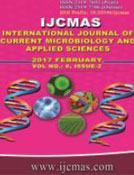


 National Academy of Agricultural Sciences (NAAS)
National Academy of Agricultural Sciences (NAAS)

|
PRINT ISSN : 2319-7692
Online ISSN : 2319-7706 Issues : 12 per year Publisher : Excellent Publishers Email : editorijcmas@gmail.com / submit@ijcmas.com Editor-in-chief: Dr.M.Prakash Index Copernicus ICV 2018: 95.39 NAAS RATING 2020: 5.38 |
The alkaline lake Lonar is situated in buldhana District of Maharashtra, India. The lake is around 50-60 thousand years old and water is alkaline (pH 10.36). It is the third largest meteorite crater in basaltic rock in the world, with a diameter of 1,800 m. While Lake Bosmatvi in Ghana, has a diameter of 10,000 m and lake New Quebec in Canada with a diameter of 3,500 m. The alkaliphilic cyanobacteria in this lake have developed mechanisms for their survival in alkaline environments. The alkaliphilic cyanobacteria Phormidium sp. isolated from Lonar lake was able to tolerate a concentration of 1M Na2CO3 this reveled its existence in the lake throughout the year. In order to reveal its carbonate transport system a variation of NaCl along with Na2CO3 was done which resulted that a small amount of NaCl is need for the transport of carbonates. The cyanobacterial sheath under carbonate stress was isolated and FTIR of the sheath material was done. The FTIR spectra gave a characteristic features of the sheath isolated from Phormidium sp at 1M Na2CO3 concentration between the range of 1000-3000 cm-1. It was established that the investigated cyanobacterium possessed two carbonate transport systems operational at pH 9 and 10. This reflects the adaptation of the cyanobacteria to seasonal variation in the alkaline- saline lake Lonar. Thus the alkaliphilism or adaptation of cyanobacteria in the alkaline lake lonar was understood which depends on the seasonal salinization and desalinization cycles.
 |
 |
 |
 |
 |